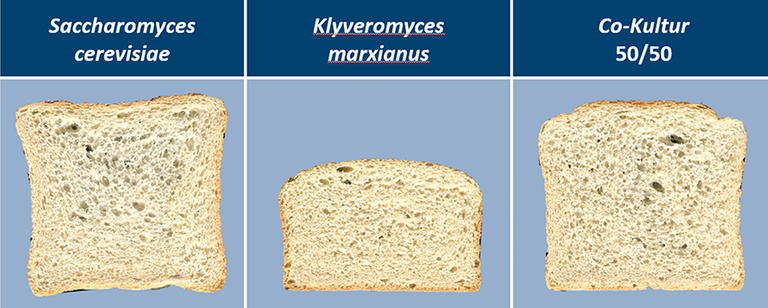Both symbolically and physically, bread is in a league of its own when it comes to the human diet. But in some people, certain bakery products can also have a negative impact. Researchers at the Max Rubner-Institut are exploring how this can be avoided. It emerges that the production process and its influence on the group of carbohydrates embraced by the term “FODMAP” are crucial.
One of the most common gastro-intestinal functional disorders is known as irritable bowel syndrome (IBS). The symptoms and impact on the patient’s well-being and quality of life include flatulence, bloating and diarrhoea. In roughly half of those affected, carbohydrates that are non-digestible, osmotically active and fermentable by microorganisms have been identified as the cause of the symptoms. They are subsumed under the acronym FODMAP (fermentable oligo-, di- and monosaccharides, and polyols) and include fructose, lactose and mannitol as well as fructo- and galacto-oligosaccharides.
Bread and bakery products are some of the major staple foods in European diets. But these foodstuffs are also a source of FODMAP in human nutrition. Drawing on the scientific literature, various approaches to producing FODMAP-reduced bakery products were identified. These included extending proofing times, using alternative yeasts and the targeted addition of sourdough. As the basis for the bakery products produced on lab scale, refined and wholemeal wheat flour was used. To date, there had been no studies on producing FODMAP-reduced bakery products under normal conditions, including using rye flour.
Studies conducted in the last four years at MRI’s Department of Safety and Quality of Cereals in Detmold aimed to analyse the FODMAP content and other relevant carbohydrates in various breads made of different kinds of flour, taking account of differing standard production methods. Initial results showed that white breads produced under standard commercial conditions are generally considered to be low in FODMAP. It is thus not necessary to specifically reduce FODMAP in products made from refined wheat flour. In wholemeal wheat flour and wholemeal rye flour products, on the other hand, FODMAP content is considerably higher. Due to their health and dietary benefits, preference should nonetheless be given to consuming rye and wholemeal breads. Bakery products made from these flours therefore need to be produced differently to make them digestible for those suffering from IBS. Consequently, the above-mentioned approaches to FODMAP reduction (longer proofing times, alternative yeasts, use of sourdough) were used during the production process with the proviso that the resulting bakery goods must satisfy the criteria of consumer acceptance and marketability.
The simplest way of modifying the production process is to extend the proofing in order to allow more time for the baker’s yeast to metabolise. This means some FODMAP components, such as short-chain fructans and fructose, can be reduced further without being completely eliminated. Long-chain fructans cannot be broken down by the enzymes in baker’s yeast and are thus not eliminated by longer proofing times. Given that using baker’s yeast as the only raising agent does not sufficiently reduce FODMAP, researchers investigated the suitability of the yeast Kluyveromyces marxianus. This yeast breaks down FODMAP, especially fructo-oligosaccharides, very effectively, but there are limitations to producing high-quality baked goods as this yeast is not a strong enough raising agent. By using co-cultures of the two yeasts, however, it was possible to produce breads that did not differ from those in which conventional baker’s yeast was used whilst still effectively reducing FODMAP by not only breaking down fructans into fructose but also continuing to metabolise the fructose.
Breads can also be made with sourdough. The Detmold 3- and 1-step procedures are common methods. Sourdough is often used in bread production because it helps to improve aroma, texture and shelf life. At the same time, however, this process changes the quality and composition of the nutrients in the flour. With regard to FODMAP, sourdough fermentation facilitates the degradation of fructans but can, in turn, release mannitol. So, whilst it was possible to change the FODMAP profile using sourdough, it did not lead to a sufficient reduction in the compounds belonging to FODMAP.
Investigations to date have shown that increasing proofing time and using sourdough in wholemeal wheat and rye breads do reduce the FODMAP content. But the reduction is not sufficient to make them suitable for IBS patients. Moreover, so far, low-FODMAP foodstuffs made of white flour are by definition low in fibre which works against the patient’s gut health. In order to investigate this problem in more detail the Department of Safety and Quality of Cereals is planning a further research project to produce low-FODMAP, high-fibre enriched bakery products. It aims to explore and optimise the selective degradation of FODMAP whilst retaining the non-FODMAP fibre in bakery products based on wheat and rye. Furthermore, researchers intend to study other raw materials that have as yet hardly been considered in relation to the FODMAP issue.
Scientific publication (engl.)
Schmidt, M., Sciurba, E. Determination of FODMAP contents of common wheat and rye breads and the effects of processing on the final contents. Eur Food Res Technol 247, 395–410 (2021).
https://link.springer.com/article/10.1007/s00217-020-03633-6


